Homeownership for Introverts and HSPs
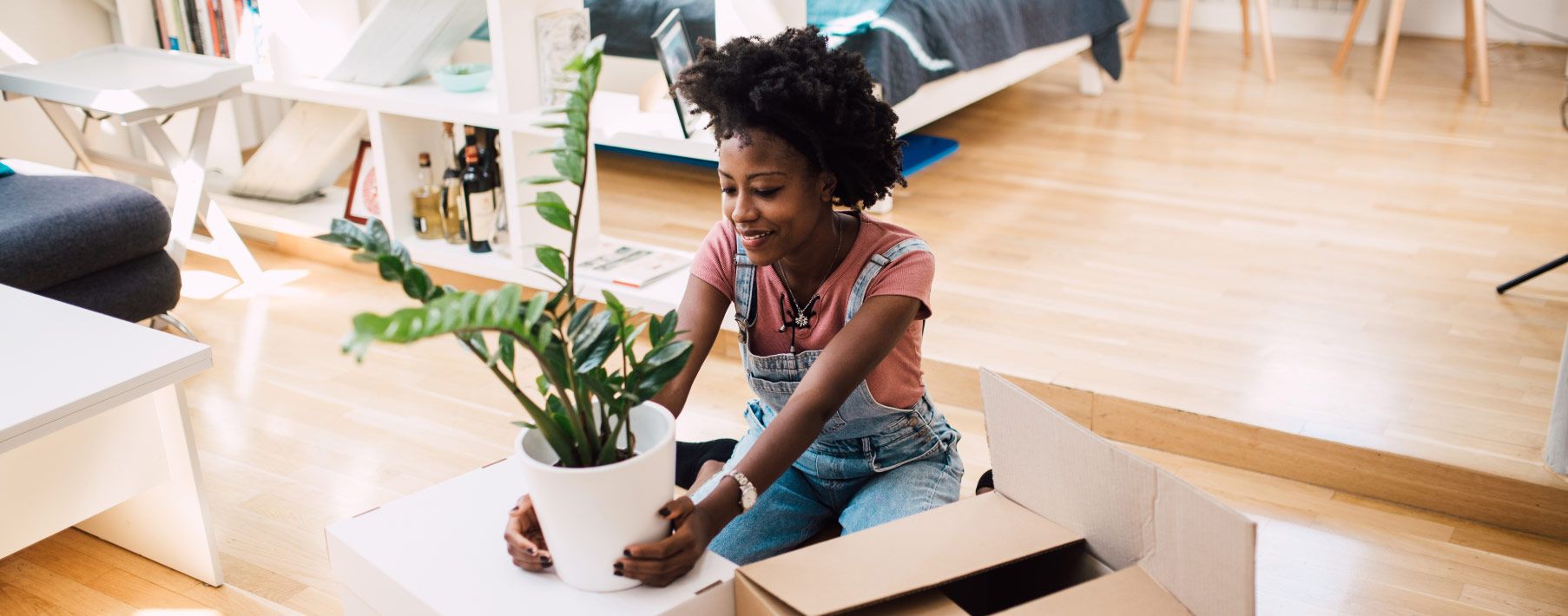
Many people may not think twice about going to a party or heading to the mall to pick up a last-minute gift. If you have social anxiety, are an introvert, or are a highly sensitive person (HSP), you may find these tasks easier said than done. While not every introvert is highly sensitive or socially anxious (and vice versa), there’s no denying that buying and owning a home can be stressful for just about everyone.
To help those who need it, the team at Hippo has created the ultimate guide to homeownership for introverts, HSPs and everything in between. From the benefits of owning a home by yourself to how to navigate a competitive market without getting overwhelmed, keep reading for everything you need to know about buying and maintaining a home that fits your needs.
Introverts and HSPs: what’s the difference?
First, we must dive into the differences between introverts, HSPs and the socially anxious. While every person is different — it’s completely possible to be an extroverted HSP, an introverted social butterfly, an anxious HSP or anything in between — people that find themselves in these categories may be especially prone to stress during intense situations (such as shopping for a home).
That’s why we created this guide, to help anyone (and everyone) who feels like they need more help dipping into the real estate market and keeping their new home up to snuff. Check out our breakdown of introverts vs. HSPs below, and keep reading for more information on how to make the home buying process a breeze — no matter who you are.
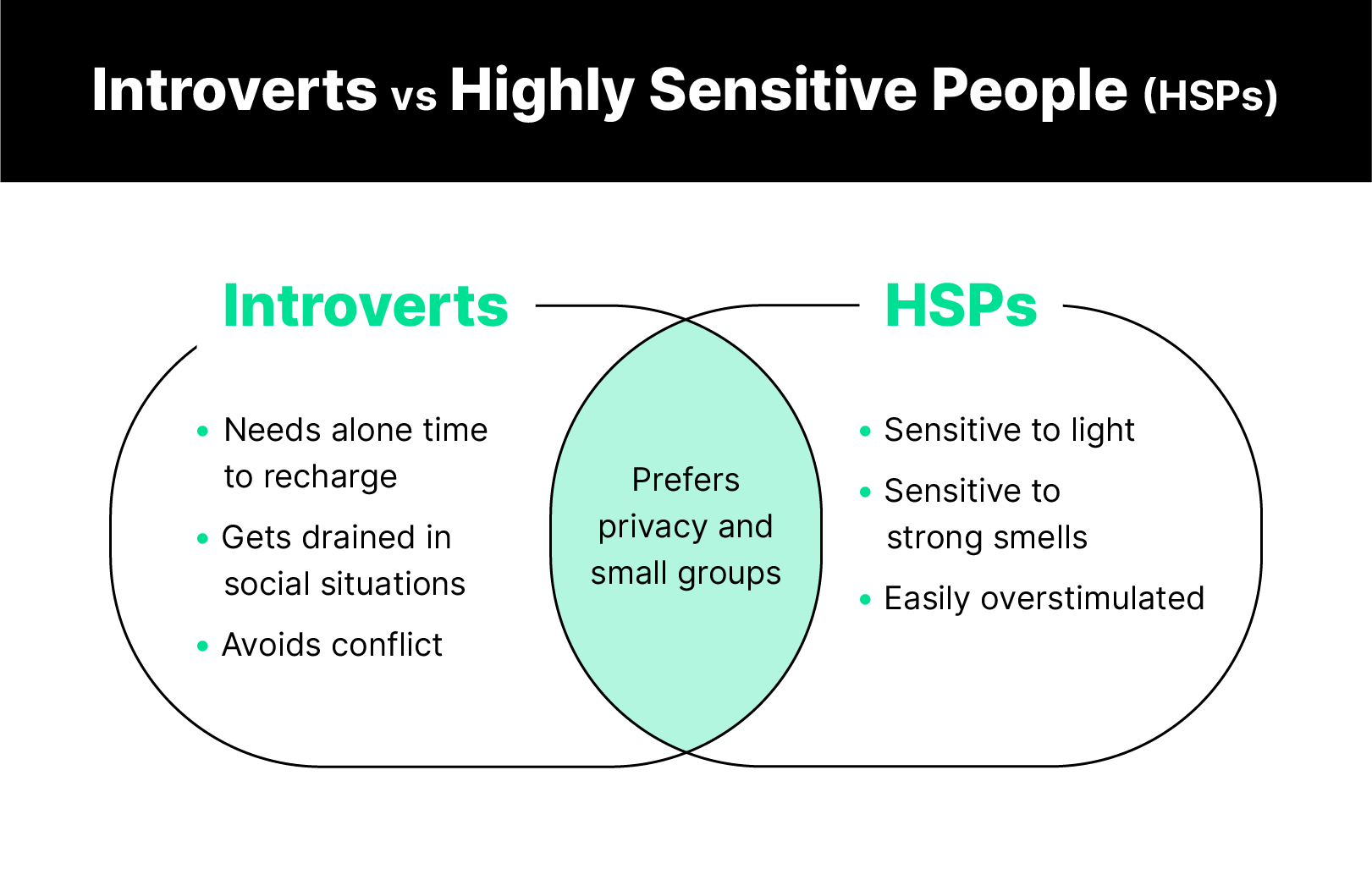
Why should introverts and HSPs consider homeownership?
Buying a home can be a daunting process, filled with plenty of social interaction, stressful negotiations and a lot of time spent in unfamiliar places. These situations are enough to make even the most extroverted person exhausted, so it makes sense that some introverts (though not all) may prefer to stay in their rental home or apartment long-term. But owning a home is a major milestone in many adults’ lives for a reason — it helps boost confidence, builds long-term wealth and is often considered a sign of success. Want more proof? Let’s turn to the experts.
“Homeownership improves mental health and confidence in a few ways,” said Dr. Holly Schiff, Psy.D., a licensed clinical psychologist at JFS Greenwich. “It increases self-esteem, control and autonomy, which are all associated with better mental health. Those who become homeowners typically report higher life satisfaction and higher perceived control over their lives.”
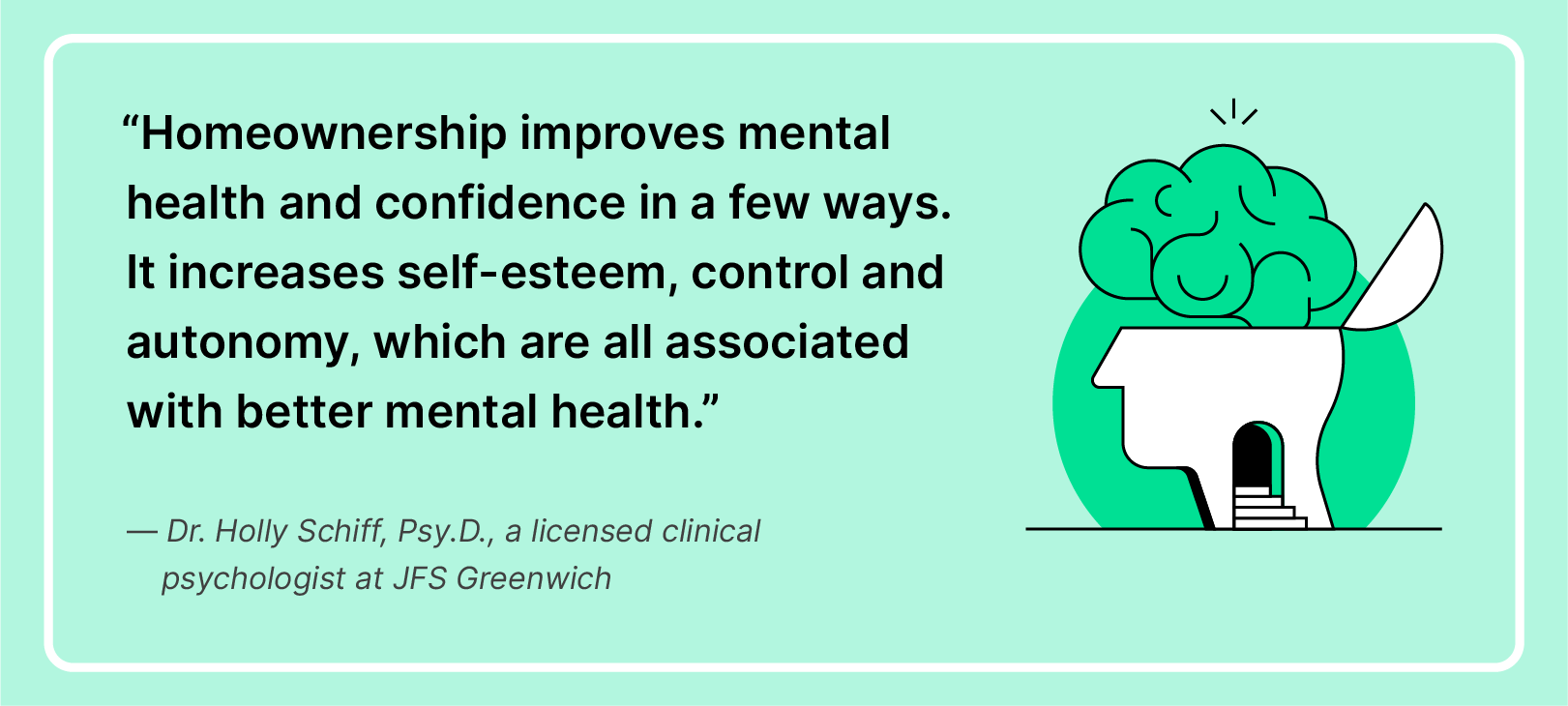
In addition, we spoke to Dr. Brian Wind of JourneyPure, who echoed Dr. Schiff’s sentiments. “It can be very satisfying to have your own space that you own and be able to provide that space for everyone in your family,” said Dr. Wind. “A higher quality of housing can also lower mental distress and improve overall feelings of well-being.”
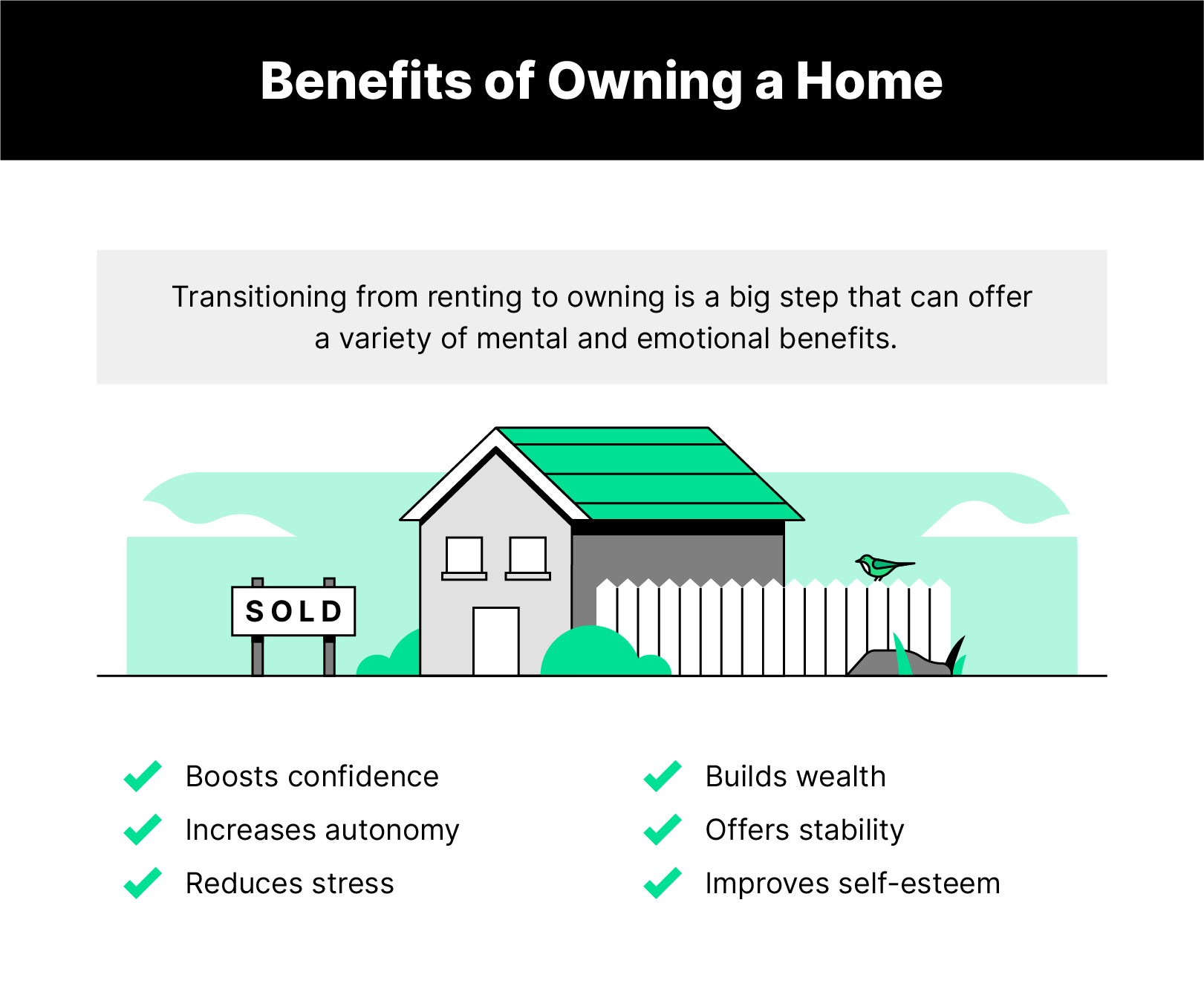
Your guide to buying a home
Whether you're buying a starter home, a vacation home or your family’s next home, the following tips will help introverts of all experience levels make educated decisions and get through the process with ease (and plenty of alone time to recharge).
Know what you want in your future home
Before you start working with a real estate agent or touring homes, it's crucial to determine what you want out of your future home. While shiny new appliances and hardwood floors can certainly be enticing, having a list of features you really need before getting started can help ensure you make the right decisions even if you get overwhelmed (which — let’s face it — can happen to anyone).
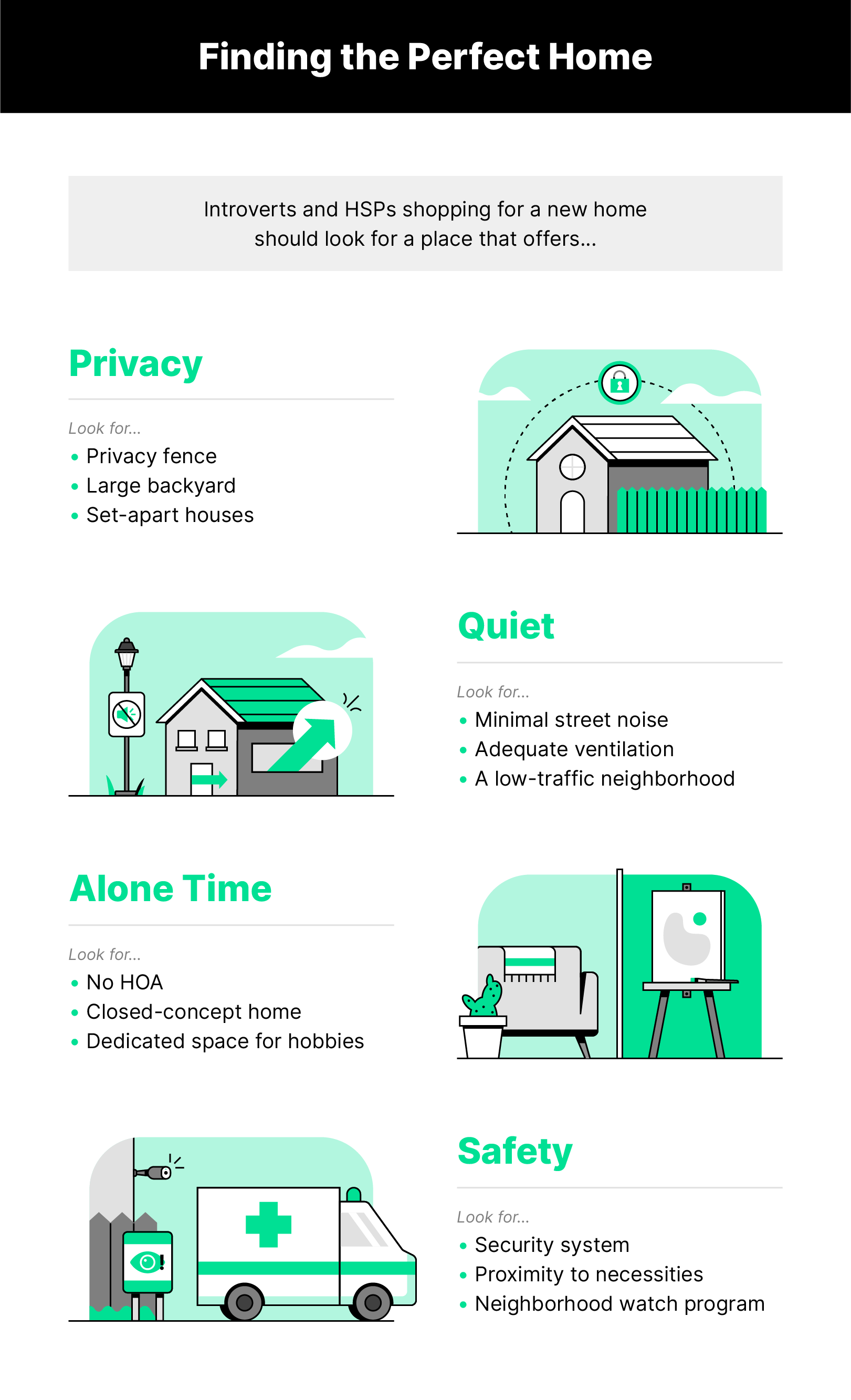
First, make a list of things you love (and hate) about your current living situation. Use that as a guidebook for what you want in your next home. For instance, if you love taking a bath to unwind, but your current tub leaves a lot to be desired, a garden tub might be on your list of must-haves.
Regardless if you’re an introvert, extrovert, or HSP, noisy neighbors can cause a lot of stress. Because of this, it’s crucial for everyone to look for a quiet neighborhood. “Houses situated in quiet neighborhoods can be attractive for highly sensitive home buyers since they might not want to recharge in a loud place that could stress them out,” said Ben Reynolds of Sure Dividend.
Another thing to consider? Closed-concept homes. Emilia Wong, an Interior Design Advisor from HomeRenoGuru, said that these types of homes could lower noise levels and prevent jarring echoes. “A closed-concept home gives introverts the opportunity to create a safe haven or private space where they can rejuvenate after a long day of interaction,” explains Emilia.
Other key features for introverts to look out for in their future home include:
- A backyard with a privacy fence
- A safe neighborhood
- Adequate ventilation
- An HOA-free neighborhood
- Dedicated space for meditation or hobbies
- Minimal street noise
- Proximity to necessities
Find a compassionate real estate agent
Having the right real estate agent can make or break the home buying process, no matter if you're an introvert or extrovert. After all, they’re the ones who will take you from home to home and help negotiate to get you the home you want. But finding the right real estate agent can be tough, as your agent is responsible for advocating for you even yet they may barely know you.
“Introverted homebuyers should look for a real estate agent with truly exceptional communication skills and who will communicate with you using your preferred methods,” said Chuck Vander Stelt, a real estate agent with Quadwalls. “Introverted homebuyers should strongly consider using an experienced real estate agent, too. Experienced agents have a better ability to move efficiently through a transaction and can more quickly resolve any complications.”
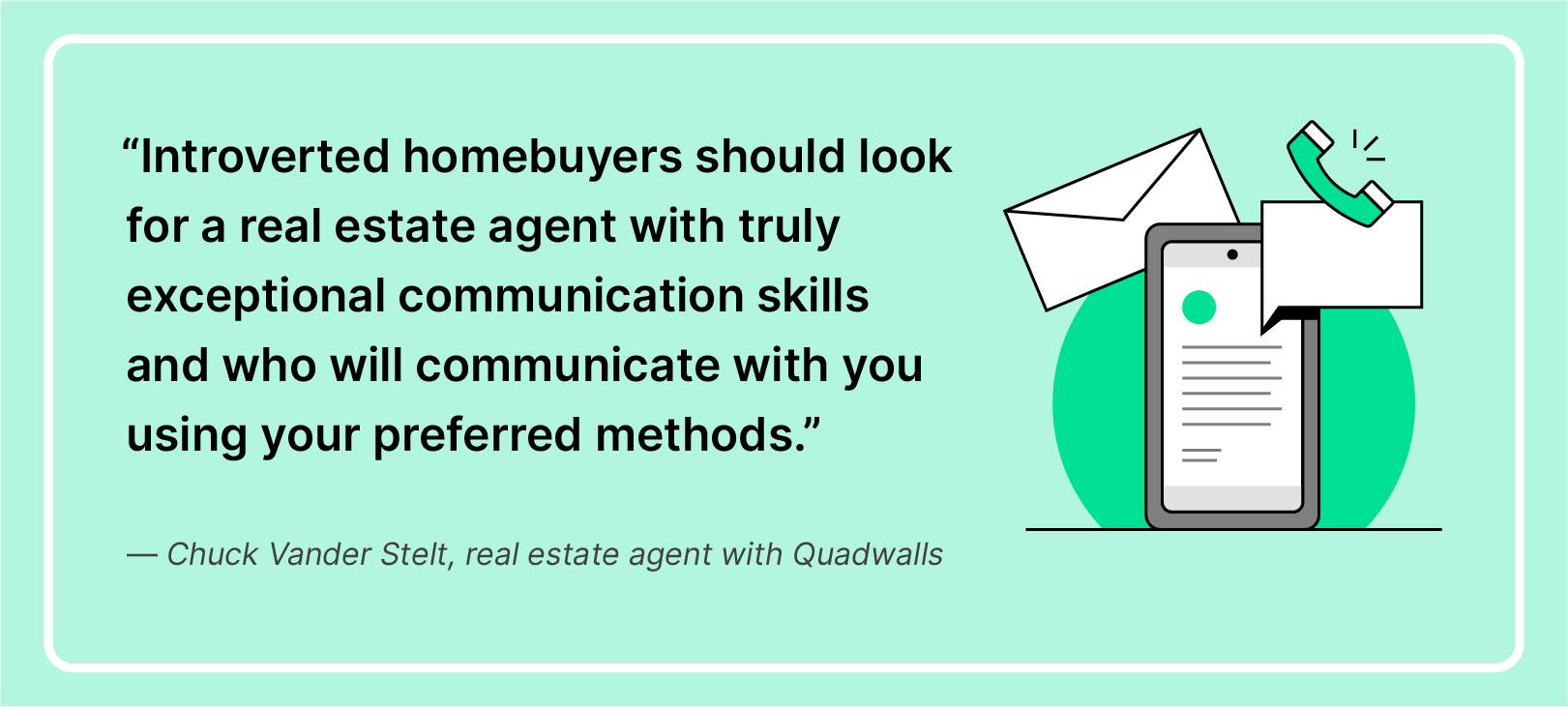
If you have a real estate agent but still find yourself struggling to keep up with everything that needs to be done, try delegating more tasks to your agent. That’s what you hired them for, after all! “By entrusting the process to a real estate professional, an introvert no longer has to worry about stressful interactions with the other party,” said Cameron Miller, CEO of Cameron Miller Real Estate. “If the deal pushes through, all that an introvert has to do is just sign the contract itself.”
Do some prep work
If you are someone who experiences stress and anxiety, it’s a good idea to prepare yourself for the home buying process ahead of time. This includes financial aspects such as getting pre-approved for a loan, getting a quote for home insurance and gathering documents such as bank statements and proof of employment. Writing a letter to your potential seller ahead of time is a good idea as well, though you may need to make a few tweaks to cater your letter to each particular home.
Thanks to technology, you might be able to get some of the more annoying parts of shopping for a home out of the way without even having to get up off the couch. “With the wealth of resources and information available online, you can easily speak to sellers through apps [or] via text. This is less daunting than in-person interactions and you can explore your options with ease,” said Martin Orefice, founder of Rent To Own Labs.
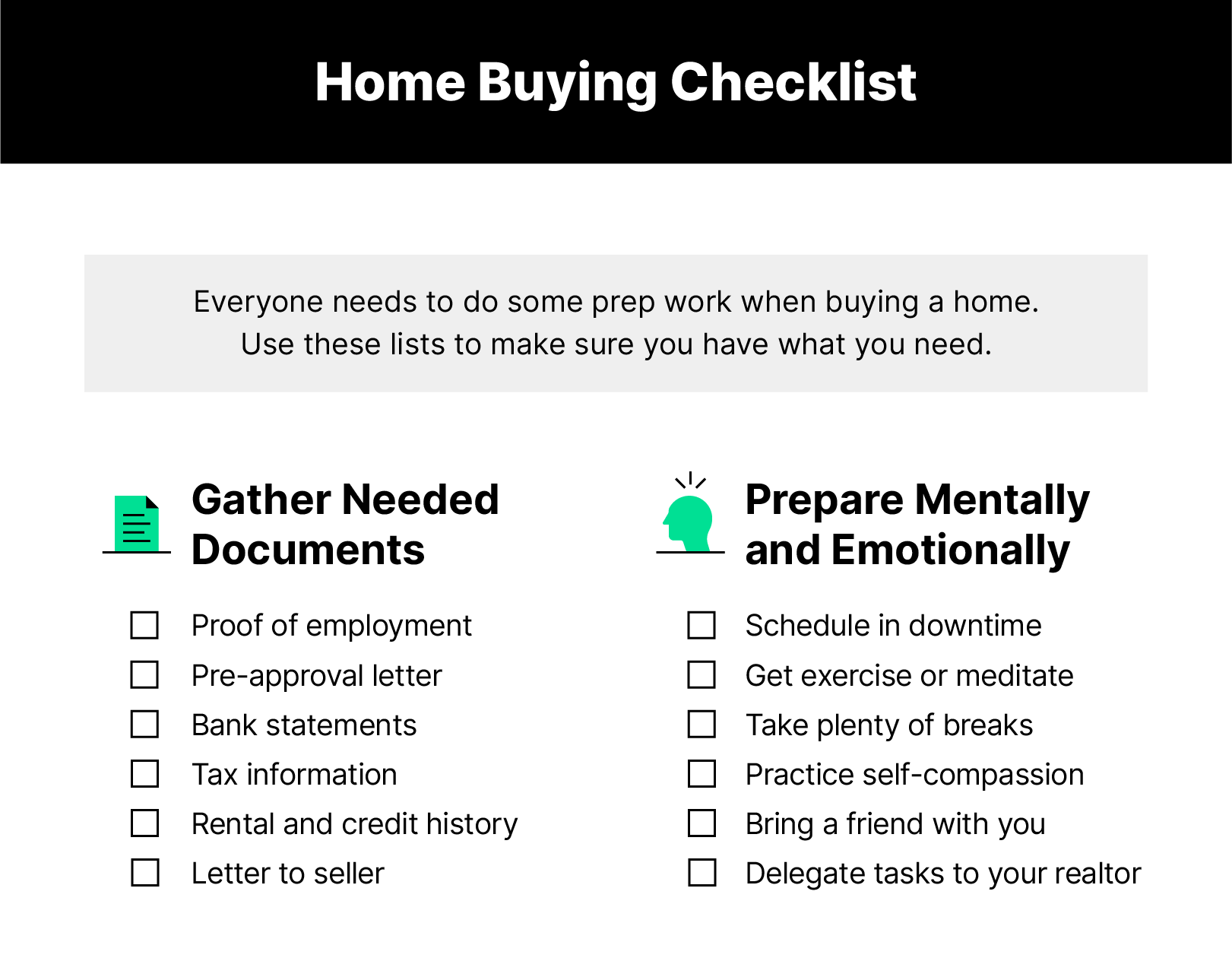
Practice mindfulness
Outside of the traditional prep work, introverts should also take some time to prepare themselves mentally for the home buying process. Exercising, meditating and giving yourself alone time to recharge between showings are all terrific ways to ensure you enjoy the process and don’t get overwhelmed.
“Introverts recharge best on their own, so take breaks from thinking about the home buying process or preparing all the documents and things you need,” said Dr. Brian Wind, Chief Clinical Officer at JourneyPure. “Sit back and relax, immerse yourself in a hobby and remind yourself to enjoy building your life and settling in.”
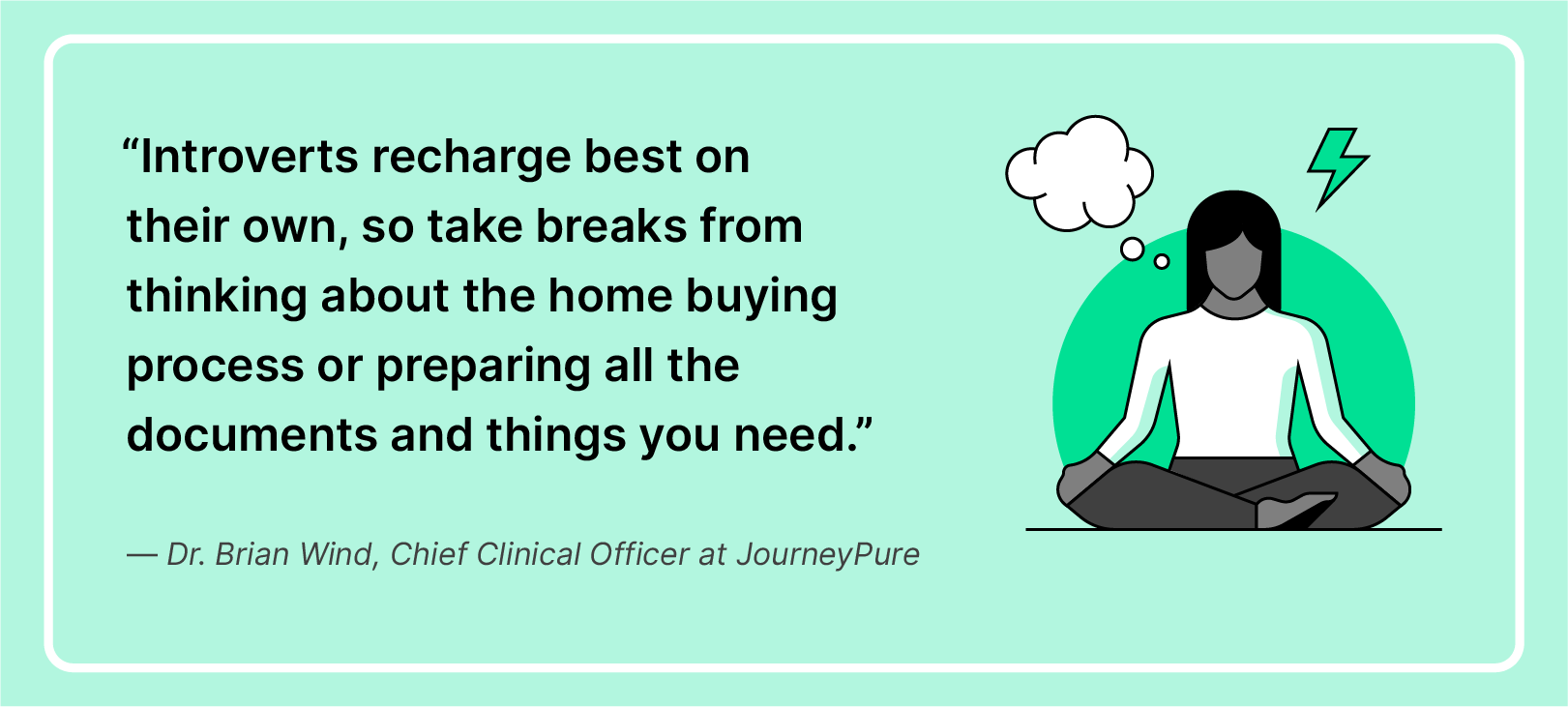
It’s also imperative to be kind to yourself if things don’t go according to plan. “Practice self-compassion during the [home buying] process since it will definitely be stressful. Give yourself a break, be accepting of who you are and be gentle with yourself and what you need during that time,” explains Dr. Holly Schiff, Psy.D. at JFS Greenwich.
You bought a home — now what?
After the papers have been signed, the boxes unpacked and the dust settled, you can finally begin to settle into your new home. To make sure your home works for your specific needs and stays in great condition over time, try out the following tips catered to introverted homeowners.
Decorate for your needs
Your home’s layout and decor say a lot about you and can even affect how you feel on a day-to-day basis. As an introvert or HSP you may not be hosting a huge party anytime soon, it’s still a good idea to decorate your home to help you feel comfortable. This includes removing any harsh lighting or smells, laying out your furniture to create multiple, smaller hangout spots and surrounding yourself with things that make you happy. You can even base your decor decisions on your personality type.
“Even though introverts enjoy spending time alone, they still like to feel safe and loved. Decorating their space with personal photographs or nostalgic artwork will remind them of happy memories and put them more at ease in their space,” suggests Stuart Clark, interior expert at Victory Curtain and Blinds.
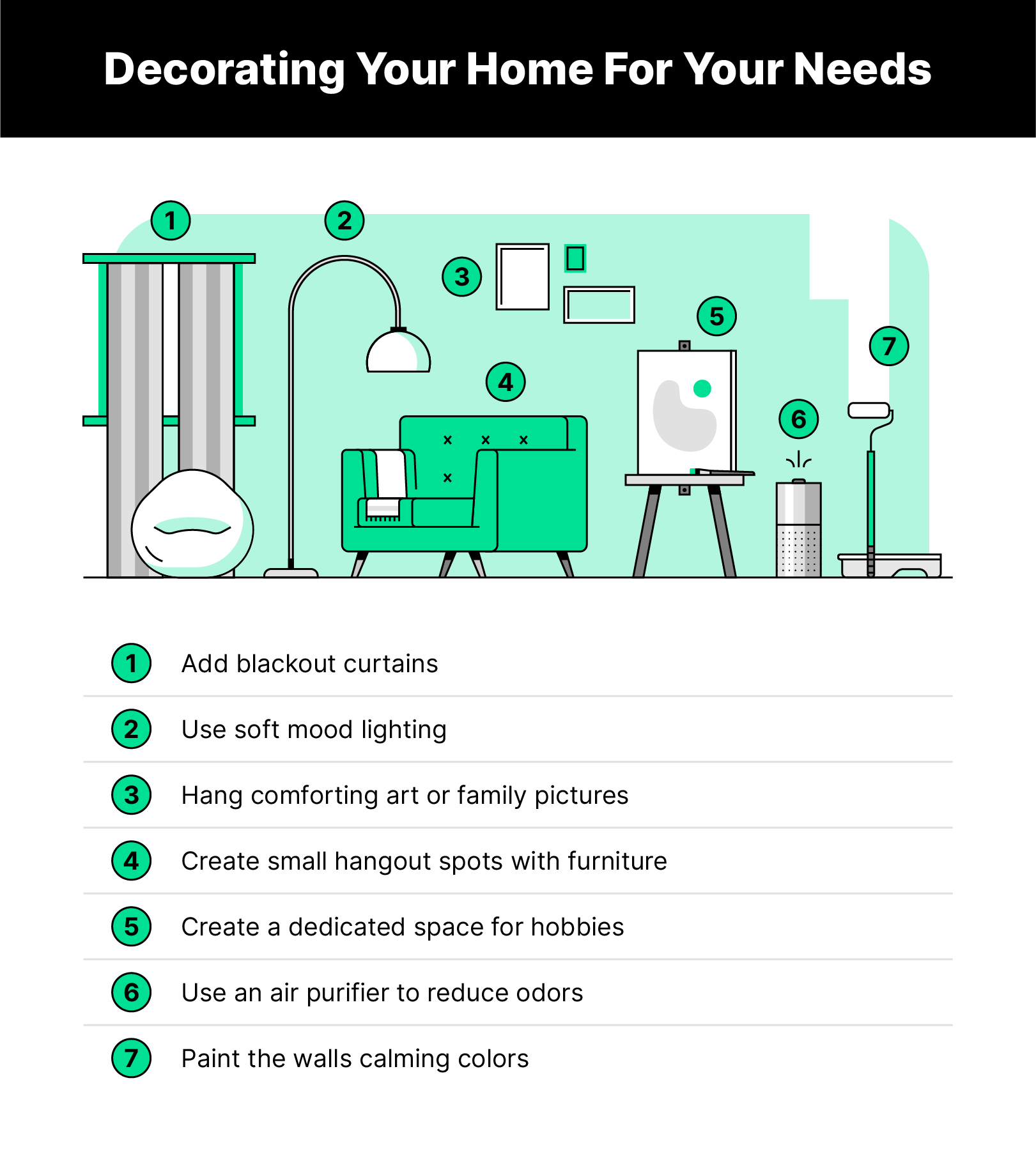
If you find yourself under the category of an HSP, there are additional considerations you need to take into account when decorating your home. “For those who are highly sensitive to light, sound or smell, it’s very important to create an environment that doesn't overstimulate,” said Sylvia James, an interior designer at HomeHow. “You could try using window shades or blackout curtains, soft lighting, lamps with a dimmer switch and light-blocking glasses at night.”
Don’t be afraid to DIY it
Sometimes, even the best home can benefit from a DIY project. Home renovation and DIY projects can boost mental health, improve confidence and even increase your home’s value.
Innovative DIY projects for introverts include creating a sacred space for alone time (or for working at home), creating an outdoor oasis and painting your walls. Unsure which color to paint your walls? Andre Kazimierski, the CEO of Improovy, has some suggestions: “When painting, try to pick things with warm undertones. For example, instead of bright white walls, pick a warm-toned off-white.”
If you want to tackle a home improvement project but aren’t sure where to start, download some of these home renovation apps to get expert help at your fingertips. Another bonus? You can even get paid for some of these home upgrades! Check out our roundup of home renovation programs for more information.
How to easily maintain your home
Putting off home repairs is almost a rite of passage for most homeowners, even if it does lead to bigger problems down the line. This can be especially true for introverts, who may want to avoid picking up the phone and inviting a stranger into their home if possible. Because of this, it’s a good idea to look for a service that lets you book appointments online to avoid any unnecessary stress.
Services like Hippo Home Care are a fantastic option for introverts, as they allow you to book a wide range of services online, read reviews and rest easy knowing that you’re hiring a well-vetted and highly qualified expert.
Getting home insurance coverage
Despite where you fall on the introverted or HSP scales, getting home insurance for your new place is a must. Home insurance helps financially protect you in the event of damage to your home or personal property or in the event of a liability issue. Luckily, providers like us let you get a quote and buy home insurance entirely online, allowing you to get the coverage you need with ease (though we have plenty of friendly agents standing by should you need to chat).
Although buying a home can be a bit of a challenge for anyone, it also comes with many benefits, such as increased confidence and long-term wealth. Looking for a compassionate home insurance company that gets it? Look no further because Hippo’s got your back.




